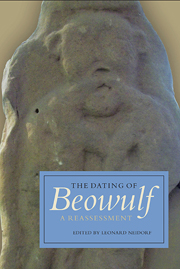Book contents
- Frontmatter
- Contents
- List of Tables
- List of Illustrations
- List of Contributors
- Acknowledgements
- Introduction
- 1 Beowulf and Language History
- 2 Germanic Legend, Scribal Errors, and Cultural Change
- 3 Names in Beowulf and Anglo-Saxon England
- 4 The Limits of Conservative Composition in Old English Poetry
- 5 The Date of Composition of Beowulf and the Evidence of Metrical Evolution
- 6 Beowulf and the Containment of Scyld in the West Saxon Royal Genealogy
- 7 History and Fiction in the Frisian Raid
- 8 ‘Give the People What They Want’: Historiography and Rhetorical History of the Dating of Beowulf Controversy
- 9 A Note on the Other Heorot
- 10 Beowulf and Conversion History
- 11 Material Monsters and Semantic Shifts
- 12 Scandals in Toronto: Kaluza's Law and Transliteration Errors
- 13 Afterword: Beowulf and Everything Else
- Index
4 - The Limits of Conservative Composition in Old English Poetry
Published online by Cambridge University Press: 05 October 2014
- Frontmatter
- Contents
- List of Tables
- List of Illustrations
- List of Contributors
- Acknowledgements
- Introduction
- 1 Beowulf and Language History
- 2 Germanic Legend, Scribal Errors, and Cultural Change
- 3 Names in Beowulf and Anglo-Saxon England
- 4 The Limits of Conservative Composition in Old English Poetry
- 5 The Date of Composition of Beowulf and the Evidence of Metrical Evolution
- 6 Beowulf and the Containment of Scyld in the West Saxon Royal Genealogy
- 7 History and Fiction in the Frisian Raid
- 8 ‘Give the People What They Want’: Historiography and Rhetorical History of the Dating of Beowulf Controversy
- 9 A Note on the Other Heorot
- 10 Beowulf and Conversion History
- 11 Material Monsters and Semantic Shifts
- 12 Scandals in Toronto: Kaluza's Law and Transliteration Errors
- 13 Afterword: Beowulf and Everything Else
- Index
Summary
As the introduction to this collection makes clear, the various forms of linguistic and metrical evidence bearing on the dating of Beowulf point to a date of composition fairly early in the Anglo-Saxon period. In his article for The Dating of Beowulf in 1980, Thomas Cable proposed a rough guide to the metrical dating of poems using the incidence of type C, D, and E verses, which decline in frequency over the Anglo-Saxon period. Cable's criterion places Beowulf toward the beginning of a relative chronology. Since then, much additional metrical and linguistic evidence has been gathered that places Beowulf in the early to mid-eighth century. R.D. Fulk's A History of Old English Meter is the most substantial work of this kind, for it examines the presence of archaic metrical features through-out the corpus of Old English poetry and finds that Beowulf is by far the most archaic poem. Since that work, other scholars have written articles on individual metrical or linguistic features of the poetic corpus, which have corroborated the conclusions that Fulk so carefully reached.
Some scholars, however, remain dubious about the reliability of this type of evidence. At this point, the force of linguistic scholarship is too formidable to be undermined by the doubts raised by E.G. Stanley, who urged that the poem should not be dated by means of sundry linguistic oddities that could well be scribal error or just a few bad lines.
- Type
- Chapter
- Information
- The Dating of BeowulfA Reassessment, pp. 79 - 96Publisher: Boydell & BrewerPrint publication year: 2014



